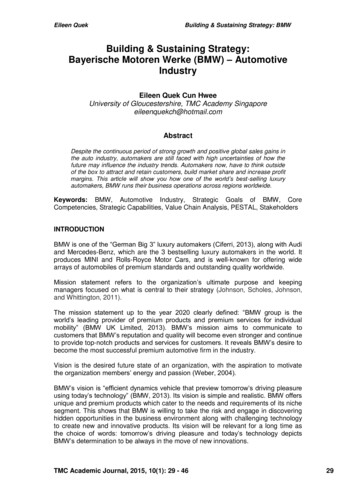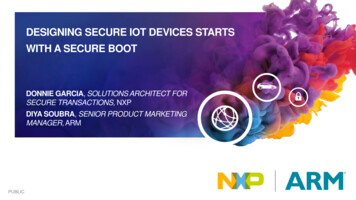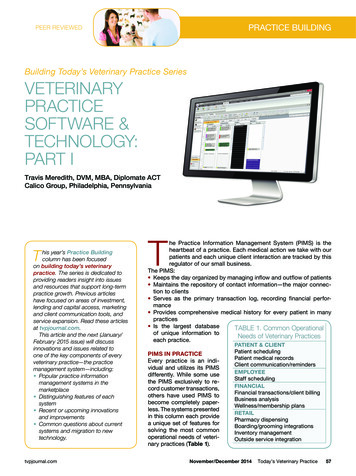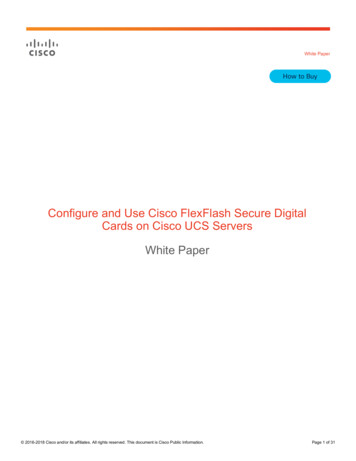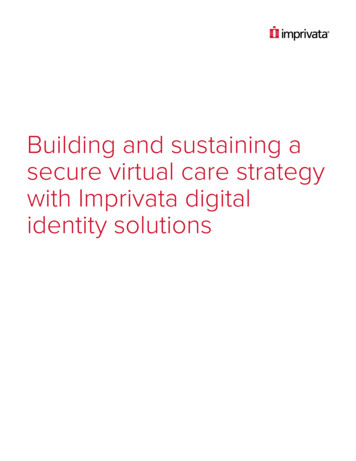
Transcription
Building and sustaining asecure virtual care strategywith Imprivata digitalidentity solutions
Building and sustaining a secure virtual care strategy with Imprivata digital identity solutionsHealthcare delivery organizations (HDOs) have rapidly implementedtelehealth strategies and remote care options in response to COVID-19.They are developing policies and protocols to incorporate virtual care intotheir long-term strategies. At the same time, HDOs are also re-thinking theinpatient experience to improve safety for patients, clinicians, staff,and visitors.Imprivata solutions have helped HDOs across the globe mitigate risk andmanage response to the COVID-19 pandemic, as well as the successfulimplementation of virtual care strategies, by: Reducing the risk of spreading infectious disease throughcontactless workflows Enabling a seamless experience for new and remote clinical workflows Supporting low-touch, remote implementation and managed services Improving security and maintaining compliance by adapting digitalidentity strategies and solutionsThis paper outlines how Imprivata technologies and professional servicesofferings have been implemented by our HDO customers to supportCOVID-19 response, as well as to help shape virtual care initiatives that willdeliver lasting benefits for patients, clinicians, and support staff.The emergence of virtual care in COVID-19 responseThe COVID-19 pandemic has rapidly accelerated adoption of telehealth andtelemedicine to support remote clinician/patient encounters. The initialimpetus for telehealth adoption in the setting of the COVID-19 pandemic wasfor infection control purposes to reduce risk and adhere to social distancingrequirements. But there are many additional, longer-term benefits as well.Telehealth is often more convenient for patients, and it can reduce patientre-admissions, emergency department visits, and healthcare insurance coststo employers, among other benefits.Remote care is likely here to stay, and technology plays a critical role infacilitating the successful long-term adoption of virtual care. However, thescope must be broadened from just patient encounters via video conferenceto a holistic remote care strategy that integrates all facets of care delivery,both inside and outside the hospital walls.
Building and sustaining a secure virtual care strategy with Imprivata digital identity solutionsFor example, many HDOs are conducting inpatient rounding via videoconsults to minimize the risk of clinical staff coming into contact with patientsor over-utilizing personal protective equipment (PPE) to make their routinerounds. Similarly, patients are using video conferencing and other tools forvirtual visits with their families and loved ones, while maintaining adherenceto strict visitation policies.Outside of the hospital, virtual care requires interaction among care teamswho can be widely distributed geographically. This requires more efficient andeffective communication and collaboration. Converting in-person clinicalworkflows to remote often requires an adaptation of technology solutions,processes, and applicable policies.Imprivata supports these initiatives by delivering purpose-built solutions thatenable these new and innovative workflows in a way that is safe, efficient, andsecure for all users – including the IT teams being asked to implement them.Increasing safety by enabling contactless workflows to reduce therisk of spreading diseaseImprivata solutions increase safety for patients, providers, non-clinical staff,and others in a number of different ways, including monitoring for exposure toinfectious disease and supporting virtual rounding and patient visitation.Monitoring for potential exposure to infectious diseasesHealthcare organizations are leveraging Imprivata solutions to monitor for thepossible exposure to (and subsequent spreading of) infectious disease inreal-time. Yale New Haven Health (New Haven, Conn.) uses ImprivataOneSign login data to identify users who have been in areas of the hospitalwith a potential risk of infection.Imprivata OneSign provides the granularity to narrow down which specificusers have accessed workstations in different departments, helping Yaleidentify users who are potentially at risk (for example, those users whoaccessed a workstation in a specific location of the hospital where a patientwith an identified infectious disease may be).This is accomplished by analyzing the information that Imprivata OneSigncollects when users tap their proximity badge to access a workstation.Imprivata OneSign creates a centralized audit record of the user’s name, theworkstation they accessed, the time and date they accessed the workstation,and how long they used it. By matching this data to the location of theworkstation, Yale can determine which specific users were in areas with ahigh risk of infection, and they can take any necessary actions.Take a closer look
Building and sustaining a secure virtual care strategy with Imprivata digital identity solutionsOrganizations are also using Imprivata OneSign to streamline access tosymptom-free attestation workflows. Many organizations require their clinicalstaff to demonstrate that they are symptom-free in order to start their shift.Using a survey application, organizations ask questions related to the CDC’sCOVID-19 symptoms guideline. Imprivata OneSign can be integrated withthese applications to enable fast, simple badge-tap access to the surveyapplication. Requiring clinical staff to authenticate to complete the survey alsoincreases compliance and allows organizations to identify, in real-time, anyanswers indicating that a user could be positive for COVID-19.Supporting virtual rounding and patient visitsAs part of the effort to reduce the risk of spreading infectious disease, manyorganizations have adopted virtual patient visits as well as virtual in-patientrounding and consults. Imprivata solutions support these initiatives byenabling the rapid, secure deployment and management of iPads andiPhones as well as providing patients and clinicians with fast, secure access tomobile and other devices.Take a closer lookThe University of Rochester Medical Center (Rochester, N.Y.), like mostorganizations, put restrictions in place for hospital visitation in an effort toreduce the risk of spreading infectious disease. To facilitate this change,URMC provides iPads to patients so they can communicate with would-bevisitors. These iPads are shared among patients, so URMC needs a way toquickly provision and configure the devices, wipe them clean of personal databetween users, and reset the devices back to a “ready state” for the nextpatient to use. Imprivata Mobile helps URMC manage these devices bydigitally sanitizing the devices, reconfiguring the proper tools and applicationsfor patients, and securing them for the next patient’s use, all while theyare charging.Organizations are using similar workflows to support virtual in-patientrounding. This includes using iPads to conduct in-patient consults via video.Cutting down on contact with COVID-19 patients is critical to reducingexposure and flattening the curve. Hospitals are now using iPads to facilitateon-site telehealth sessions, where appropriate, to handle certain interactionswith patients kept in isolation. By providing patients with iPads during theirstay, clinicians can conduct video check-ins. Imprivata Mobile allowsorganizations to automatically manage the configuration, and digitalsanitization of shared iOS device to ensure patient privacy andHIPAA compliance.
Building and sustaining a secure virtual care strategy with Imprivata digital identity solutionsImprivata solutions are also used to enable virtual consults between in-patientclinical staff and remote physicians. Cambridge Health Alliance (Cambridge,Mass.) deployed Microsoft Surface Pro tablets in the ICU that will be sharedamongst clinicians to enable virtual consultations with remote physicians andother support staff. To streamline this workflow, Cambridge Health Allianceuses Imprivata OneSign to support fast, secure badge-tap access to theSurface Pro devices and applications. This reduces the need for users totouch the tablet screens to log in, which helps mitigate the risk ofcontracting infections.Take a closer lookEnabling secure, efficient clinical workflows outside thehospital wallsThe success and sustainability of virtual care depends on the ability to adaptworkflows in a secure and efficient way for all users. This requires moreefficient and effective communication and collaboration. It also necessitatesreplicating clinical workflows for a remote setting.Imprivata solutions help support this transition to remote and distributed careby replicating the same fast, consistent clinical workflow experience that careteams currently experience when they are in the hospital. This includesenabling secure and efficient remote network access, delivering simplifiedaccess to clinical workflows via the cloud, and supporting remote enrollmentfor electronic prescribing for controlled substances (EPCS).Children’s Hospital of the King’s Daughters (Norfolk, Va.), like manyorganizations, experienced a rapid increase in its remote workforce inresponse to COVID-19. This required the hospital’s IT team to quickly deliverremote network access for a greater number of users to allow them tocontinue to do their jobs effectively. This access still needs to be secure,particularly as hackers are taking advantage of the COVID-19 pandemicthrough targeted phishing attacks and similar scams. Children’s Hospital ofthe King’s Daughters and other organizations are delivering secure remoteaccess with Imprivata Confirm ID , the enterprise multifactor authenticationplatform for healthcare.Imprivata Confirm ID improves security for virtual and remote workflows byenforcing two-factor authentication for access to cloud applications. UsingImprivata ID, Imprivata’s convenient phone-based token app, providers andnon-clinical staff can quickly but securely access applications anytime,anywhere. This includes both clinical and non-clinical applications such asvideo conferencing, finance and billing, HR, and others. And, when integratedwith Imprivata OneSign Web SSO, access to these applications is simplifiedfurther, all while maintaining security.Take a closer look
Building and sustaining a secure virtual care strategy with Imprivata digital identity solutionsTake a closer lookOrganizations are also using Imprivata to simplify and streamline clinicalworkflows in a remote setting. Imprivata integrates with VMware HorizonCloud Service to deliver single sign-on, EPCS, and other clinical workflows viavirtual desktops delivered from the cloud. To better enable work from homeas well as from temporary facilities, organizations need an elastic capability todeliver virtual desktops to their remote and distributed users. Throughdelivery of virtual desktops from the cloud, organizations achieve thiscapability and can provide desktops at the scale they need for their userbase. This gives users fast, secure access to their applications and workflows,allowing them to adapt care to a remote environment.Remote EPCS is particularly important for enabling end-to-end virtual care –and promoting safety – because it eliminates paper prescriptions andtherefore does not require the in-person interaction between patients andproviders necessary to pick up a physical prescription.Imprivata supports anytime, anywhere EPCS by allowing providers to quicklyand easily complete the two-factor authentication requirement for EPCS usingthe same Imprivata ID mobile application used for remote network andapplication access. With a simple swipe from the lock screen, providers cansign EPCS orders from anywhere. Imprivata also offers Hands FreeAuthentication and fingerprint biometrics to further improve workflowefficiency and minimize physical interaction with authentication devices.Imprivata also delivers automated remote identity proofing and providerenrollment for EPCS. The Imprivata Confim ID enrollment utility enablescredentialing staff to quickly identity proof providers and enroll theircredentials via web conferencing. For organizations requiring individual IDproofing, Imprivata partners with DigiCert, a federally approved CertificationAuthority, to allow providers to complete the identity proofing process incompliance with DEA requirements.Supporting IT with remote deployment, enrollment andadministration servicesHealthcare IT teams have played a crucial role in the industry’s response tothe COVID-19 pandemic and are now developing strategies andimplementation plans to support virtual care. IT is being asked to supportthese initiatives with limited resources and uncertainty surrounding budgets.Imprivata is helping IT organizations plan for and adapt to these newrequirements by delivering solutions to automate workflows and processesthat save time and free up IT resources to focus on higher-value activities andprojects. Imprivata Professional Services has also fully adapted to be able toimplement Imprivata solutions, enroll users, and provide ongoingadministration with no on-site requirements.
Building and sustaining a secure virtual care strategy with Imprivata digital identity solutionsImprivata Identity Governance enables automated user provisioning forappropriate application access. An increase in remote workforce andadoption of virtual care requires users to have different access rights – careteam members may shift and expand roles and users may need remoteaccess to applications they didn’t previously require. This access must besecure and audited, which is particularly important in a rapidly evolving virtualcare environment.Manual processes for managing this access are cumbersome, timeconsuming, and prone to error. Imprivata Identity Governance automates thisprocess while keeping a comprehensive audit trail, allowing organizations toprovide faster user access to free up IT resources without compromisingsecurity and compliance.Virtua Health (Marlton, NJ), for instance, leverages Imprivata IdentityGovernance to supports its ramp up of remote workers, particularly those innon-clinical administrative roles. Specifically, these users need access toSkype – which required provisioning – to communicate and collaborate.Using Imprivata Identity Governance, the Virtua IT team was able to provisionaccess to Skype for about 400 additional users in less than one hour. Thisprocess allowed users to immediately start using Skype to complete theirremote work while maintaining an audit record of users with access to thatapplication.Imprivata Identity Governance can also be configured to quickly provisionaccess for critical applications that normally would require a manual approvalworkflow, without losing audit trail. This allows for users to be on-boardedquickly and given access to applications they need to do their jobs on dayone. In a remote setting, manual workflows could delay this access and createsignificant inefficiencies to the virtual care process. Imprivata IdentityGovernance automates this access, without compromising security orauditing.And provisioning requirements are not limited to users. HDOs are quicklyadopting mobile devices to support virtual workflows, including patientvisitation and in-patient consultations, as previously discussed. Devices usedin these and other workflows are often corporate-owned and shared amongststaff and/or patients. This places a burden on IT to ensure that these devicesare delivered in the proper state to support video conferencing needs, fromthe initial device provisioning to the re-imaging and resetting of devicesbetween each use.Take a closer look
Building and sustaining a secure virtual care strategy with Imprivata digital identity solutionsImprivata Mobile supports the rollout of shared mobile devices by deliveringautomated device provisioning, secure device assignment, and fast, secureaccess for users, helping customers unlock the full potential of shared mobiledevices by ensuring a fast, efficient workflow while improving security andauditability. Importantly, Imprivata delivers zero-effort, automated iOS deviceprovisioning to reduce IT burden and device management efforts with rapidscalability. The cloud-based platform gives IT staff remote, extended reachinto every location, for device repairs, resets, and updates. This allows IT toquickly enable these devices and workflows in an efficient, low-touch way.Imprivata Professional Services is also helping to support IT throughcomprehensive, remote implementation and go-live support, as well asmanaged services offerings. Leveraging a proprietary implementationmethodology, Imprivata helps organizations at all stages of their technologyadoption lifecycle. This includes project readiness, education, optimization,and maintenance.Take a closer lookImprivata Professional Services helped Renown Health (Reno, Nev.)implement and enroll its providers for EPCS without requiring any in-person oron-site activity. Renown leveraged a new offering from Imprivata throughwhich members of the Imprivata Professional Services team serve asEnrollment Supervisors. The team completed the identity proofing andcredential enrollment with Renown’s providers remotely, allowing them toquickly enable providers for EPCS with minimal internal resourcerequirements. This same remote enrollment service is being used by otherorganizations across the U.S. to enable EPCS to comply with state and federalmandates while adapting to a remote environment.Imprivata Professional Services is also supporting resource-strapped IT teamsthrough comprehensive managed services offerings. Due to the significantchanges being made by many organizations, IT teams have had to rapidlyadjust in order to support a remote workforce and virtual workflows. Butexisting clinical workflows must still be supported, along with all other criticalbusiness needs. Imprivata Managed Services helps organizations administerImprivata solutions remotely, ensuring continued support for existing clinicalworkflows while freeing up organization IT resources to focus on othercritical tasks.
Building and sustaining a secure virtual care strategy with Imprivata digital identity solutionsSecuring a virtual care environment starts with a comprehensivedigital identity strategyThe shift to telehealth was necessary in response to the COVID-19 pandemicand has significantly disrupted what is already a hypercomplex ITenvironment for HDOs and the care delivery ecosystem.For example, many organizations experienced an immediate need to ramp upand rotate clinical staff between different roles, departments, and facilities. Atthe same time, more and more users are being required to work remotely, sothey need secure access to their applications and data. The devices fromwhich users need access is changing. Use of mobile devices – both personaland corporate-owned – has increased, and hospital-owned iPads and tabletshave been put into use to support telehealth as well as virtual patient visits.And the number and variety of applications needed for healthcare workersresponding to this crisis have also grown in number and complexity. Ofcourse, workers need rapid access in order to do their jobs, but safety,security, and compliance with privacy regulations all remain a significantconcern. Beyond the usual EHRs and other common applications, manyorganizations are developing and deploying new applications to supportCOVID response, as well as virtual care, all of which need proper accessmanagement. And there are certain applications and workflows, such asEPCS, that require a re-thinking of existing processes.To successfully integrate and scale these and other initiatives as part of alonger-term virtual care strategy, organizations need to implement the samesecurity and compliance foundation they’ve applied to their in-patient,on-premises infrastructur
The University of Rochester Medical Center (Rochester, N.Y.), like most organizations, put restrictions in place for hospital visitation in an effort to reduce the risk of spreading infectious disease. To facilitate this change, URMC provides iPads to patients so they can communicate with would-be visitors.
